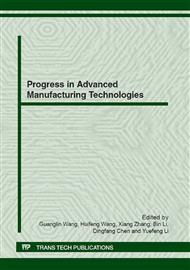p.293
p.297
p.302
p.307
p.313
p.319
p.323
p.327
p.332
A Method for Knowledge Reasoning of Mechanical Product Intelligent Design Using Information Entropy
Abstract:
Because of the universality, complexity and uncertainty of mechanical design knowledge, knowledge reasoning and integration of intelligent design system was one of the difficult problems. The valuation of weight by human was used in many methods for knowledge reasoning at present. In order to make the intelligent product design become more scientific and rational, and eliminate the subjective human factors, a method for reasoning using information entropy was proposed. First, by means of the advantage of the relational database include the redundancy, consistency and integrity, the mechanical product design knowledge base was established. Second, based on the information entropy theory, the weight of each attribute was calculated directly through the objective information. Third, based on the objective data in the original sample, the method for calculating the similarity between accurate attributes and uncertainty attributes and design schemes was given. Finally, this method was verified by fruit picking robot intelligent design system, and the result showed that it is objective and effective.
Info:
Periodical:
Pages:
313-318
DOI:
Citation:
Online since:
August 2012
Authors:
Price:
Сopyright:
© 2012 Trans Tech Publications Ltd. All Rights Reserved
Share:
Citation:


